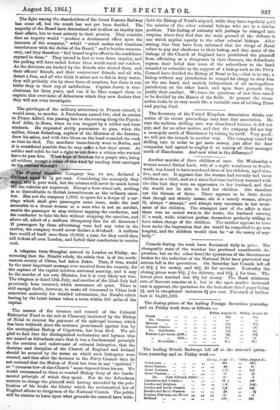The answer of the trustees and council of the Colonial
Bishoprics Fund to the suit in Chancery instituted by the Bishop of Natal to recover the payment of his episcopal income, which has been withheld since the sentence pronounced against him by the metropolitan Bishop of Capetown, has been filed. We are glad to find that the distinguished ecclesiastics and laymen who are named as defendants state that it was a fundamental principle in the erection and endowment of colonial bishoprics, that the doctrine and discipline of the Church of England and Ireland should be secured by the terms on which such bishoprics were erected, and that after the decision in the Privy Council they do not contend that the Bishop of Natal has been in any " spiritual " or " common-law-of-the-Church " sense deposed from his see. We would recommend to them to remind Bishop Gray of the funda- mental principle of which they speak. Nor do the defendants venture to charge the plaintiff with having exceeded by the pub- lication of his books the liberty which the ecclesiastical law of England allows to clergymen of the National Church. The public will be curious to learn upon what grounds the council have with-
held the Bishop of Natal's stipend, while they have regularly paid the salaries of the other colonial bishops who are in a similar position. This feeling of curiosity will perhaps be changed into surprise, when they find that the main ground of the defence is one which applies equally to the other colonial bishops. After stating that they have been informed that the clergy of Natal refuse to pay any obedience to their bishop, and that many of the bishops of the Church of England have prohibited the plaintiff from officiating as a clergyman in their dioceses, the defendants express their belief that none of the subscribers to the fund intended to subscribe to the support of a bishop such as the Privy Council have decided the Bishop of Natal to be,—that is to say, a bishop without any jurisdiction to compel his clergy to obey him on the one hand, and entirely independent of all metropolitan jurisdiction on the other hand, and upon these grounds they justify their conduct. We leave the questions of law thus raised to be decided by the Master of the Rolls. At present the trans- action looks to us very much like a veritable case of robbing Peter and paying Paul.






























 Previous page
Previous page